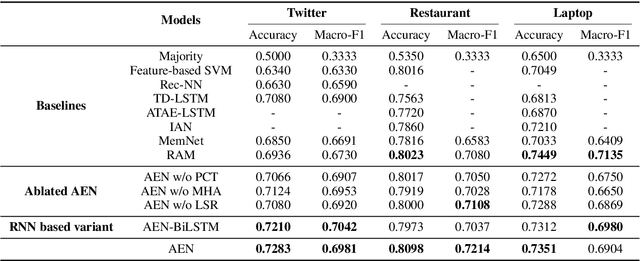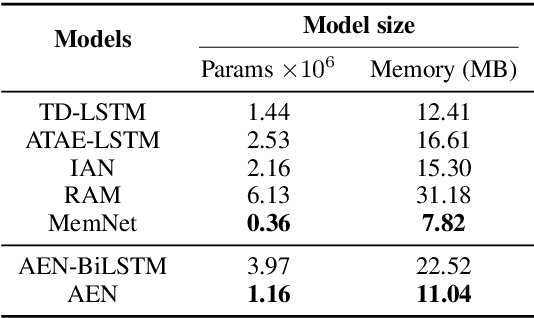Youwei Song
A Multi-task Learning Model for Chinese-oriented Aspect Polarity Classification and Aspect Term Extraction
Feb 12, 2020



Abstract:Aspect-based sentiment analysis (ABSA) task is a multi-grained task of natural language processing and consists of two subtasks: aspect term extraction (ATE) and aspect polarity classification (APC). Most of the existing work focuses on the subtask of aspect term polarity inferring and ignores the significance of aspect term extraction. Besides, the existing researches do not pay attention to the research of the Chinese-oriented ABSA task. Based on the local context focus (LCF) mechanism, this paper firstly proposes a multi-task learning model for Chinese-oriented aspect-based sentiment analysis, namely LCF-ATEPC. Compared with existing models, this model equips the capability of extracting aspect term and inferring aspect term polarity synchronously, moreover, this model is effective to analyze both Chinese and English comments simultaneously and the experiment on a multilingual mixed dataset proved its availability. By integrating the domain-adapted BERT model, the LCF-ATEPC model achieved the state-of-the-art performance of aspect term extraction and aspect polarity classification in four Chinese review datasets. Besides, the experimental results on the most commonly used SemEval-2014 task4 Restaurant and Laptop datasets outperform the state-of-the-art performance on the ATE and APC subtask.
Utilizing BERT Intermediate Layers for Aspect Based Sentiment Analysis and Natural Language Inference
Feb 12, 2020



Abstract:Aspect based sentiment analysis aims to identify the sentimental tendency towards a given aspect in text. Fine-tuning of pretrained BERT performs excellent on this task and achieves state-of-the-art performances. Existing BERT-based works only utilize the last output layer of BERT and ignore the semantic knowledge in the intermediate layers. This paper explores the potential of utilizing BERT intermediate layers to enhance the performance of fine-tuning of BERT. To the best of our knowledge, no existing work has been done on this research. To show the generality, we also apply this approach to a natural language inference task. Experimental results demonstrate the effectiveness and generality of the proposed approach.
Attentional Encoder Network for Targeted Sentiment Classification
Apr 01, 2019



Abstract:Targeted sentiment classification aims at determining the sentimental tendency towards specific targets. Most of the previous approaches model context and target words with RNN and attention. However, RNNs are difficult to parallelize and truncated backpropagation through time brings difficulty in remembering long-term patterns. To address this issue, this paper proposes an Attentional Encoder Network (AEN) which eschews recurrence and employs attention based encoders for the modeling between context and target. We raise the label unreliability issue and introduce label smoothing regularization. We also apply pre-trained BERT to this task and obtain new state-of-the-art results. Experiments and analysis demonstrate the effectiveness and lightweight of our model.
 Add to Chrome
Add to Chrome Add to Firefox
Add to Firefox Add to Edge
Add to Edge